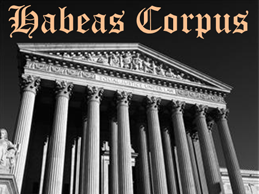THE WRIT OF HABEAS CORPUS
I. General Overview
II. Federal Writ of Habeas Corpus For Those In State Custody 28 USCA 2254
III. Federal Writ of Habeas Corpus For Those In Federal Custody 28
USCA 2255I. General Overview
A Writ of Habeas Corpus is a civil proceeding that is available in both State and Federal Court to challenge the legality of imprisonment. The term stems from the Latin meaning “you have the body” and dates back to Fourteenth Century England. The Writ of Habeas Corpus is now codified in both New York State and Federal Law.
Although the Writ of Habeas Corpus is available in both State and Federal Court there are a plethora of rules as to when and why the Writ can be brought in either of those courts.
In New York State Courts the Writ of Habeas Corpus is brought before a Supreme Court Judge and can be used for a variety of reasons: to challenge one’s detention, to request a reduction in bail, to remedy one’s treatment while incarcerated etc. The remedy is generally available to anyone in State’s Custody.
In Federal Courts the Writ of Habeas Corpus had been the subject of much litigation and legislation. The statutes outlining when and why a Writ may be brought are complex as to the specific reasons that the Writ may be brought and especially when. The Antiterrorism And Effective Death Penalty Act passed in 1996 imposed a number of important substantive and time restrictions upon Writs brought in Federal Court. The list of restrictions, statutes and case law on Federal Writs of Habeas Corpus is much too long to discuss here.
If you or your client is being held in custody and want to challenge the legality of that imprisonment please contact my office immediately as there are important time limitations that must be complied with.
II. 2254. State custody; remedies in Federal courts
State custody; remedies in Federal courts
(a) The Supreme Court, a Justice thereof, a circuit judge, or a district court shall entertain an application for a writ of habeas corpus in behalf of a person in custody pursuant to the judgment of a State court only on the ground that he is in custody in violation of the Constitution or laws or treaties of the United States.
(b)(1) An application for a writ of habeas corpus on behalf of a person in custody pursuant to the judgment of a State court shall not be granted unless it appears that–
(A) the applicant has exhausted the remedies available in the courts of the State; or
(B)(i) there is an absence of available State corrective process; or
(ii) circumstances exist that render such process ineffective to protect the rights of the applicant.
(2) An application for a writ of habeas corpus may be denied on the merits, notwithstanding the failure of the applicant to exhaust the remedies available in the courts of the State.
(3) A State shall not be deemed to have waived the exhaustion requirement or be estopped from reliance upon the requirement unless the State, through counsel, expressly waives the requirement.
(c) An applicant shall not be deemed to have exhausted the remedies available in the courts of the State, within the meaning of this section, if he has the right under the law of the State to raise, by any available procedure, the question presented.
(d) An application for a writ of habeas corpus on behalf of a person in custody pursuant to the judgment of a State court shall not be granted with respect to any claim that was adjudicated on the merits in State court proceedings unless the adjudication of the claim–
(1) resulted in a decision that was contrary to, or involved an unreasonable application of, clearly established Federal law, as determined by the Supreme Court of the United States; or
(2) resulted in a decision that was based on an unreasonable determination of the facts in light of the evidence presented in the State court proceeding.
(e)(1) In a proceeding instituted by an application for a writ of habeas corpus by a person in custody pursuant to the judgment of a State court, a determination of a factual issue made by a State court shall be presumed to be correct. The applicant shall have the burden of rebutting the presumption of correctness by clear and convincing evidence.
(2) If the applicant has failed to develop the factual basis of a claim in State court proceedings, the court shall not hold an evidentiary hearing on the claim unless the applicant shows that–
(A) the claim relies on–
(i) a new rule of constitutional law, made retroactive to cases on collateral review by the Supreme Court, that was previously unavailable; or
(ii) a factual predicate that could not have been previously discovered through the exercise of due diligence; and
(B) the facts underlying the claim would be sufficient to establish by clear and convincing evidence that but for constitutional error, no reasonable fact finder would have found the applicant guilty of the underlying offense.
(f) If the applicant challenges the sufficiency of the evidence adduced in such State court proceeding to support the State court’s determination of a factual issue made therein, the applicant, if able, shall produce that part of the record pertinent to a determination of the sufficiency of the evidence to support such determination. If the applicant, because of indigency or other reason is unable to produce such part of the record, then the State shall produce such part of the record and the Federal court shall direct the State to do so by order directed to an appropriate State official. If the State cannot provide such pertinent part of the record, then the court shall determine under the existing facts and circumstances what weight shall be given to the State court’s factual determination.
(g) A copy of the official records of the State court, duly certified by the clerk of such court to be a true and correct copy of a finding, judicial opinion, or other reliable written indicia showing such a factual determination by the State court shall be admissible in the Federal court proceeding.
(h) Except as provided in section 408 of the Controlled Substances Act, in all proceedings brought under this section, and any subsequent proceedings on review, the court may appoint counsel for an applicant who is or becomes financially unable to afford counsel, except as provided by a rule promulgated by the Supreme Court pursuant to statutory authority. Appointment of counsel under this section shall be governed by section 3006A of title 18.
(i) The ineffectiveness or incompetence of counsel during Federal or State collateral post-conviction proceedings shall not be a ground for relief in a proceeding arising under section 2254
III. 2255. Federal custody; remedies on motion attacking sentence
Federal custody; remedies on motion attacking sentence
(a) A prisoner in custody under sentence of a court established by Act of Congress claiming the right to be released upon the ground that the sentence was imposed in violation of the Constitution or laws of the United States, or that the court was without jurisdiction to impose such sentence, or that the sentence was in excess of the maximum authorized by law, or is otherwise subject to collateral attack, may move the court which imposed the sentence to vacate, set aside or correct the sentence.
(b) Unless the motion and the files and records of the case conclusively show that the prisoner is entitled to no relief, the court shall cause notice thereof to be served upon the United States attorney, grant a prompt hearing thereon, determine the issues and make findings of fact and conclusions of law with respect thereto. If the court finds that the judgment was rendered without jurisdiction, or that the sentence imposed was not authorized by law or otherwise open to collateral attack, or that there has been such a denial or infringement of the constitutional rights of the prisoner as to render the judgment vulnerable to collateral attack, the court shall vacate and set the judgment aside and shall discharge the prisoner or resentence him or grant a new trial or correct the sentence as may appear appropriate.
(c) A court may entertain and determine such motion without requiring the production of the prisoner at the hearing.
(d) An appeal may be taken to the court of appeals from the order entered on the motion as from a final judgment on application for a writ of habeas corpus.
(e) An application for a writ of habeas corpus in behalf of a prisoner who is authorized to apply for relief by motion pursuant to this section, shall not be entertained if it appears that the applicant has failed to apply for relief, by motion, to the court which sentenced him, or that such court has denied him relief, unless it also appears that the remedy by motion is inadequate or ineffective to test the legality of his detention.
(f) A 1-year period of limitation shall apply to a motion under this section. The limitation period shall run from the latest of–
(1) the date on which the judgment of conviction becomes final;
(2) the date on which the impediment to making a motion created by governmental action in violation of the Constitution or laws of the United States is removed, if the movant was prevented from making a motion by such governmental action;
(3) the date on which the right asserted was initially recognized by the Supreme Court, if that right has been newly recognized by the Supreme Court and made retroactively applicable to cases on collateral review; or
(4) the date on which the facts supporting the claim or claims presented could have been discovered through the exercise of due diligence.
(g) Except as provided in section 408 of the Controlled Substances Act, in all proceedings brought under this section, and any subsequent proceedings on review, the court may appoint counsel, except as provided by a rule promulgated by the Supreme Court pursuant to statutory authority. Appointment of counsel under this section shall be governed by section 3006A of title 18.
(h) A second or successive motion must be certified as provided in section 2244 by a panel of the appropriate court of appeals to contain–
(1) newly discovered evidence that, if proven and viewed in light of the evidence as a whole, would be sufficient to establish by clear and convincing evidence that no reasonable factfinder would have found the movant guilty of the offense; or
(2) a new rule of constitutional law, made retroactive to cases on collateral review by the Supreme Court, that was previously unavailable.


